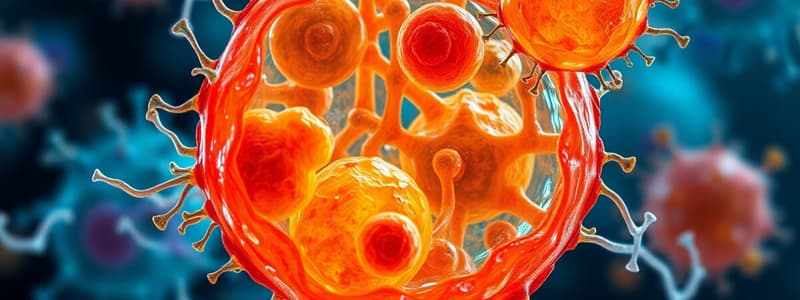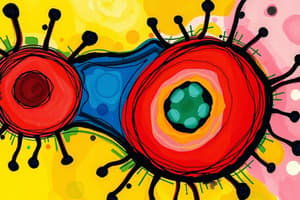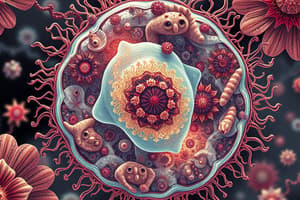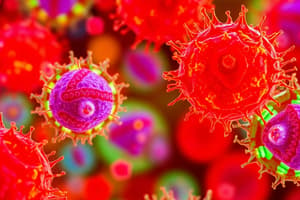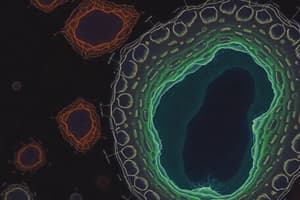Podcast
Questions and Answers
Flashcards are hidden until you start studying
Study Notes
Cell Structure and Functions
- Cells are the basic structural and functional unit of life, found in all living organisms, from single-celled bacteria to complex multicellular organisms like humans.
- The cell is the smallest unit of life that can carry out all the processes necessary for life, such as metabolism, growth, and reproduction.
- All cells share certain common features, including a cell membrane, cytoplasm, and genetic material (DNA).
- The cell membrane encloses the cell, regulating the passage of substances in and out.
- The cytoplasm is the gel-like substance that fills the cell, providing a medium for biochemical reactions.
- DNA carries the genetic information needed for cell function and reproduction.
Prokaryotic and Eukaryotic Cells
- Prokaryotic cells are simpler and smaller than eukaryotic cells.
- Prokaryotic cells lack a nucleus and other membrane bound organelles.
- Examples of prokaryotes are bacteria and archaea.
- Eukaryotic cells are more complex and larger than prokaryotic cells.
- Eukaryotic cells have a nucleus that houses the genetic material, as well as other membrane-bound organelles that perform specific functions.
- Examples of eukaryotic cells include plants, animals, fungi, and protists.
Cell Organelles and Their Functions
- Nucleus: The control center of the cell, containing DNA and directing cellular activities.
- Ribosomes: Sites of protein synthesis, built from ribosomal RNA (rRNA) and proteins.
- Endoplasmic Reticulum (ER): A network of interconnected membranes that forms a system for transporting molecules within the cell.
- Rough ER (RER): Covered in ribosomes, involved in protein synthesis and modification.
- Smooth ER (SER): Lacks ribosomes, involved in lipid synthesis, detoxification, and calcium storage.
- Golgi Apparatus: A stack of flattened membrane-enclosed sacs that process and package proteins and lipids.
- Mitochondria: The "powerhouses" of the cell, responsible for cellular respiration and ATP production.
- Lysosomes: Membrane-bound sacs containing enzymes that break down waste materials and cellular debris.
- Vacuoles: Large, fluid-filled sacs that provide storage for water, nutrients, and waste products.
- Chloroplasts: Found only in plant cells, responsible for photosynthesis using chlorophyll.
Cellular Processes
- Cellular Respiration: The process by which cells break down glucose to produce energy (ATP).
- Photosynthesis: The process by which plants and some bacteria use sunlight, water, and carbon dioxide to produce glucose and oxygen.
- Protein Synthesis: The process by which cells create proteins based on instructions from the DNA.
- Cell Division: The process by which cells reproduce, either through mitosis (for growth and repair) or meiosis (for sexual reproduction).
Importance of Cells
- Cells are essential for life, performing all the vital functions necessary for survival.
- Understanding cell structure and function is crucial for comprehending how organisms work and for developing new technologies for healthcare and other fields.
Studying That Suits You
Use AI to generate personalized quizzes and flashcards to suit your learning preferences.
